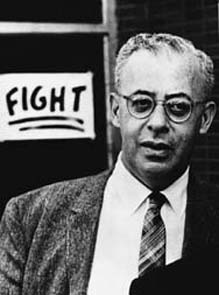
Back سول ألينسكي Arabic سول الينسكى ARZ Saul Alinsky Catalan Saul Alinsky Czech Saul Alinsky Welsh Saul Alinsky German Saul Alinsky Esperanto Saul Alinsky Spanish Saul Alinsky Finnish Saul Alinsky French
Saul Alinsky | |
|---|---|
 Alinsky in 1963 | |
| Born | Saul David Alinsky January 30, 1909 Chicago, Illinois, U.S. |
| Died | June 12, 1972 (aged 63) |
| Nationality | American |
| Education | University of Chicago (PhB) |
| Occupation(s) | Community organizer, writer, political activist |
| Years active | 1960s |
| Notable work | Rules for Radicals (1971) |
| Spouses |
|
| Children | 2 |
| Awards | Pacem in Terris Award, 1969 |
| Signature | |
 | |
| Notes | |
Saul David Alinsky (January 30, 1909 – June 12, 1972) was an American community activist and political theorist. His work through the Chicago-based Industrial Areas Foundation helping poor communities organize to press demands upon landlords, politicians, bankers and business leaders won him national recognition and notoriety. Responding to the impatience of a New Left generation of activists in the 1960s, Alinsky – in his widely cited Rules for Radicals: A Pragmatic Primer (1971) – defended the arts both of confrontation and of compromise involved in community organizing as keys to the struggle for social justice.
Beginning in the 1990s, Alinsky's reputation was revived by commentators on the political right as a source of tactical inspiration for the Republican Tea Party movement and subsequently, by virtue of indirect associations with both Hillary Clinton and Barack Obama, as the alleged source of a radical Democratic political agenda. While criticized on the political left for an aversion to broad ideological goals, Alinsky has also been identified as an inspiration for the Occupy movement and campaigns for climate action.
- ^ "Saul David Alinsky". Dictionary of American Biography. New York: Charles Scribner's Sons. 1994. Gale Document Number: BT2310018941. Retrieved September 7, 2011 – via Fairfax County Public Library.(subscription required) Gale Biography in Context.
- ^ "Saul David Alinsky Collection". Hartford, Connecticut: The Watkinson Library, Trinity College. Archived from the original on March 21, 2012. Retrieved September 7, 2011.
- ^ Brooks, David (March 4, 2010). "The Wal-Mart Hippies". The New York Times. Retrieved September 8, 2010.
Dick Armey, one of the spokesmen for the Tea Party movement, recently praised the methods of Saul Alinsky, the leading tactician of the New Left.
- ^ Fowle, Farnsworth (June 13, 1972). "A Local Agitator". The New York Times. ISSN 0362-4331. Retrieved June 17, 2023.